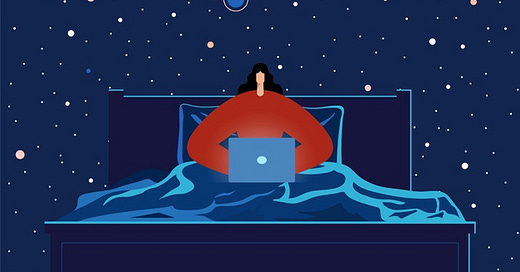Can’t Sleep? It might be Revenge Bedtime Procrastination
Finally a term for why we prefer to watch Netflix instead of getting much-needed sleep
When I first started working in the city three years ago, I made it my mission to have a “responsible” nighttime routine: get home at 7:30 p.m., dinner, shower, and be in bed by 9 p.m. so I could get that full eight hours of sleep. I fairly managed to stay on schedule, and while I lacked that “me time” during the week, I made up for it on the weekends by going out, immersing in hobbies, and visiting family. Working from home thankfully gave me tons of more time to myself in the evenings, as I didn’t have to commute. However, as I returned to the office in early 2021, I found my old routine deteriorate, my average length of sleep teetering to a little over four hours. Coming home after a two-hour commute I was exhausted, my mental capacity worn out yet as I laid in bed, I scrolled hours on TikTok or played Genshin Impact until 2 a.m. I didn’t go to bed until that time, knowing I had to wake up at 5 a.m. Was this a new COVID-related symptom? Lack of self-control? Apparently, there was a term for it: Revenge Bedtime Procrastination.

Journalist Daphne Lee tweets about the term last June.
Discover Magazine describes it as “a phenomenon where people put off sleep because they lack control over their daily lives and want to reclaim some semblance of free time.” Like with every other industry across the globe, the tourism industry was arguably the one that got hit the hardest in 2020. Because of this, my workload – like everyone else’s – became vastly different than I was used to. Work seeped into domestic life, and the lines between the both quickly blurred. Without knowing, I was desperately trying to pack as much “me time” in the nights as possible, since during the day I had none. With the monotonous Sisyphean routine during the week and the recharging on the weekends, I felt a sense of panic at the thought of this new lifestyle being robotic and never-ending. I knew I would feel worse in the morning, the inklings of regret being washed down by my morning coffee, however I could not seem to stop. The term, while first coined in 2014, seemed to pick up during the pandemic as most people working from home reportedly gained an extra three hours of work time. As with most repeated choices, it quickly can become a habit, which is dangerous. There are detrimental health and psychological effects brought on by sleep deprivation, but to many, the consequence of feeling like the control over your life is out of your grasp, sounds much more frightening. It seems I was a victim of the latter, which led to longer nights reading fan-fiction, and longer days barely functioning.
But can this be fixed? Many scholarly articles suggest forcing yourself to not engage with technology immediately before bedtime (a habit that sounds hard to cultivate in my current generation.) We’ve all heard of the “no blue-light rule” a half hour before bedtime, but following it is another story entirely. Plus, numbing my buzzing brain with 15-second dancing videos sounds like a much better alternative than lying in bed wondering if I’ll get a blood clot from our Astra-Zeneca vaccine (yikes). Many other tips include ones we have heard before, like meditating, reading, journaling and setting an alarm when it’s time for bed.
If all else fails (like it did with me) at the very least, therapist, hypnotherapist, and life coach Karl Rollison suggests not fighting it, and just accepting. “Acknowledge that it won’t last forever and try not to stress about it. Like any problem in life, it needs to be managed.” Let’s hope that eventually, we do.




